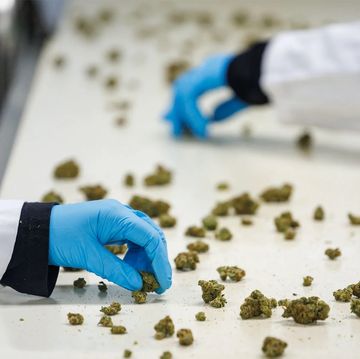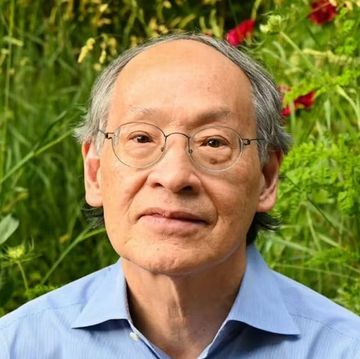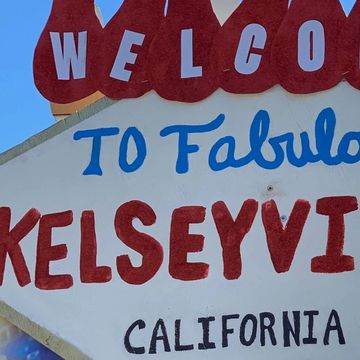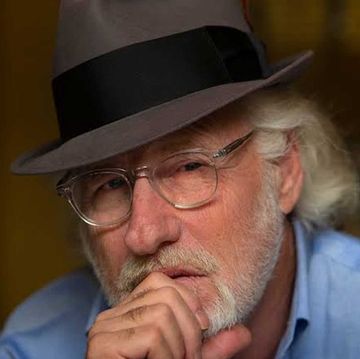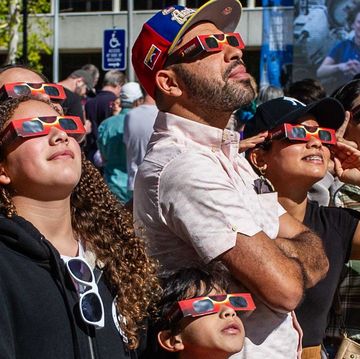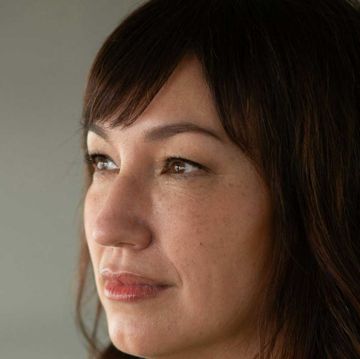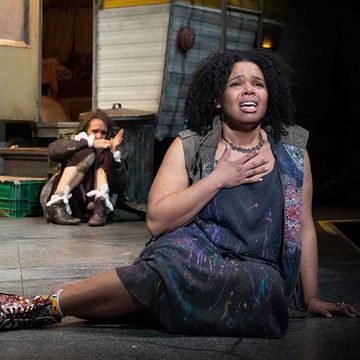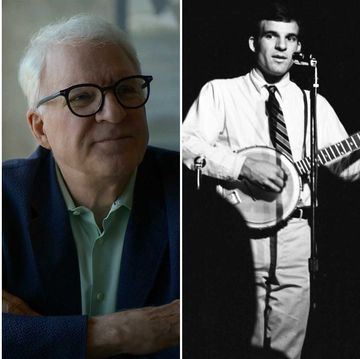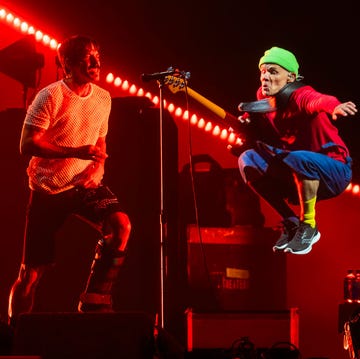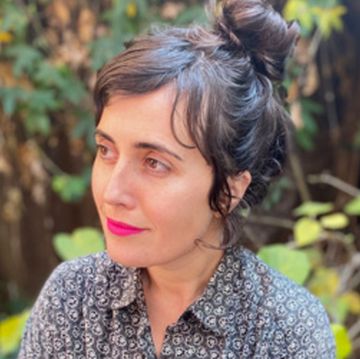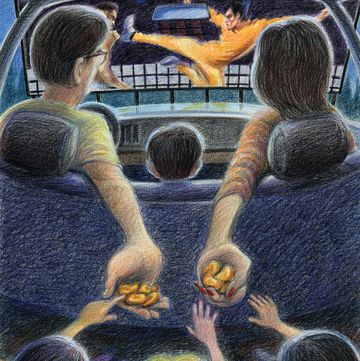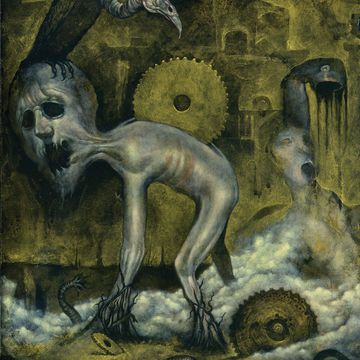On a Wednesday night in January, a Black man in his late 40s, wearing a white hoodie, track pants, and sneakers, approaches the fence surrounding a Los Angeles police station parking lot on Wilcox Avenue, a few blocks from Sunset Boulevard and the Hollywood Walk of Fame. As the man draws near, he pulls the hoodie up and over his shaved head. He spots a police officer beginning his shift, moving his belongings from his personal vehicle into a patrol vehicle. Routine behavior, nothing exceptional. But then the man in the hoodie notices that the windows on the officer’s personal vehicle are tinted a darker shade than California law permits. The man has personally witnessed hundreds of traffic stops where drivers—more often than not, Black and brown drivers—were ticketed and harassed by the Los Angeles Police Department for this same violation. He’s had enough. He reaches into his pocket, pulls out his cell phone, and begins filming.
“Cops out here, they drive around with illegal tints and missing plates, and they go out there in the streets and pull people over for those same infractions,” the man narrates while filming the officer. “And they don’t just pull them over—they handcuff them, illegally search the car, violate rights for the same infractions that you guys have on your own car. So I suggest when your shift is over, you go home and peel those motherfuckers off. You know what, if I go out there tonight and see you pull over anybody for illegal tints, I’m going to have a fucking fit.”
This article appears in Issue 24 of Alta Journal.
SUBSCRIBE
The police officer ignores the man, which only makes him more enraged. “I gave you guys a lot of slack for the last couple months on this,” he says, his voice growing louder. “I’m gonna have to come up to the station to babysit the cops, to make sure they follow the fucking rules that they enforce on us. You gotta be fucking kidding me. Get your shit in code.”
This is the start of a typical night for William Gude.
For more than two years, Gude has been patrolling the streets of Hollywood on an almost-nightly basis, documenting traffic stops and other police interactions with civilians, and live streaming or uploading these encounters for his tens of thousands of followers on social media, where he operates under the handle @FilmThePoliceLA. Gude is well-known by LAPD officers, not only in Hollywood but also in surrounding districts. He’s a vocal opponent of Chief Michel Moore. He’s been trailed by off-duty officers, insulted, threatened, and arrested multiple times. He has filed hundreds upon hundreds of policy-violation complaints against officers in Hollywood—so many that in November 2021, the LAPD’s West Bureau opened a weekly project sheet specifically to organize Gude’s torrent of complaints.
When Gude first began cop watching in Hollywood, in the late summer of 2020, he remembers, every night he’d come across at least five different police stops, and an overwhelming number of those stops were instances of racial profiling. “Of the first thousand stops that I saw in this area, 95 percent of them were Black people,” he says. “And, of them, 100 percent were handcuffed and searched. I’m talking about, didn’t use a right-turn signal, parking one foot in the red [zone], sitting in your car while it’s parked in the red. Pulled out, handcuffed, and searched.”
Aiming his camera at these confrontations, Gude narrated what was happening, not only for the benefit of his social media followers but also to make the officers aware that they were being filmed. And if Gude witnessed them doing something that he believed was a violation of policy—covering badge numbers, blocking traffic with their vehicles, obstructing Gude’s ability to film, not wearing protective face masks, driving with tinted windows, and so on—he filed a complaint or numerous complaints, resulting in a bureaucratic headache for the officers and the department.
Gude’s dedication to police accountability can resemble an obsession. Though his crusade to document, chastise, and publicly shame bad cops is clearly sincere, his indignation—as righteous and furious as Jesus’s as he overturned the money changers’ tables—at times feels personal. But when you consider he’s been arrested for doing little else than documenting police activity, it becomes easy to understand why Gude might take their attention personally. His arrest on July 1, 2021, came only two weeks after his youngest son was killed in an ambush shooting. Two more arrests followed that September. If LAPD officers were going to continue to harass and intimidate him, even after his son’s senseless murder, then he felt he had no choice but to redouble his efforts against them. Having already faced unimaginable loss, Gude took up his bullwhip and went to war.
William Gude moved from New York City to California in 2001. He first landed in Long Beach, then took a place in Brentwood, before finally settling, more than a decade ago, in Hollywood, where he rents an unassuming apartment (conveniently situated about a half dozen blocks from the Hollywood police station). He’s an avid long-distance runner, keeps a vegan diet, and owns a finance company. At first blush, Gude is the least likely candidate for the role of, in news and culture site L.A. Taco’s words, the city’s “top ‘cop-watcher.’ ” Gude, too, never considered himself an activist or a protester. His background is in business lending and running marathons, not police accountability. Everything changed for him in 2020.
After George Floyd was killed by Minneapolis police officers on May 25, protests erupted in dozens of cities and neighborhoods all across the nation, including Hollywood, which became the site of nightly unrest that often turned violent. Property destruction was rampant. The city initiated a curfew, hoping to contain the turmoil. Gude initially considered patrolling the streets near his home to protect his neighborhood from wanton vandalism. But when protesters defied the curfew, and Hollywood came to resemble a battlefield—with police officers firing rubber bullets and tear gas into crowds and attacking activists with batons—he found himself helping defend and shelter demonstrators from the police.
“You go to these protests, and you watch the cops beating the shit out of people,” Gude recalls. “It’s so unnecessary.”
At first, Gude set out to photograph, film, and file complaints against only police officers not wearing face masks, who were in violation of an LAPD directive in response to COVID. From his personal Twitter account, @William_Gude, he submitted his photos and videos to an account called @LAPDUnmasked.
By 2021, Gude had expanded to documenting officers violating other departmental policies, conducting traffic stops, harassing unhoused people, or simply standing around doing nothing and wasting taxpayers’ money. He changed his Twitter handle to @FilmThePoliceLA (@FilmThePolice was already taken). He had around 300 followers at first, and within six months he cracked the 1,000 threshold. Today, @FilmThePoliceLA has amassed over 36,000 followers on Twitter, 53,000 followers on TikTok, and thousands more on Instagram and YouTube. Gude has been written about by local and national media and invited to speak to college students. He has volunteers who help him compile data, conduct research, or act as his driver on nights when he wants to explore beyond the boundaries of Hollywood. He’s been characterized by the press as a “police accountability activist” and a “policing documentarian,” but most often as a cop watcher. He’s known internally by the LAPD as a “chronic complainer” (among other, less-savory epithets, according to Gude). Gude, as one would expect, isn’t entirely comfortable with any of these characterizations. To him, he is only documenting instances of intimidation, hypocrisy, and harassment.
“I don’t like bullies,” he says. “In a lot of ways, cop watching isn’t just cop watching. It’s dealing with a bunch of bullies that feel that they can just run over people, and they’re not used to having someone hitting them back in their face.”
The murder of George Floyd in 2020 may have set the wheels in motion for Gude’s work, but it was another murder, the following year, that hit much closer to home and made him feel like he had nothing left to lose.
On the night of June 15, 2021, Gude’s youngest son, 22-year-old Marcelis, was shot to death while standing on a street corner in South Los Angeles. The shooter or shooters fired multiple rounds, killing Marcelis and injuring an eight-year-old girl who was standing nearby. Known by his friends as Hollow, Marcelis was an upcoming rap artist who recorded as OBN Hollow or Hollow Escobar. Gude remembers his son as “a really sweet kid…a kid who would never pick on another child. Never. Never once.”
In the days following the shooting, Marcelis’s friends reached out to Gude on Twitter, sharing warm stories and offering condolences. But strangers also began emailing and tweeting at Gude to mock his son or insinuate that Marcelis had somehow deserved what had happened. To add to his anguish, Gude soon came upon a headline from a local ABC affiliate that read, “Outspoken LAPD critic now relying on LAPD to find son’s killer.” Gude raised hell, and the headline was changed, but the story still alleges that Gude “finds himself in a position he never expected: mourning his son while relying on the LAPD to try to find his killer.”
Gude disputes this portrayal as being a fabrication. After Marcelis’s murder, some members of the LAPD reached out to Gude to offer condolences and commiseration. While he welcomed these kindnesses, he doesn’t believe the LAPD is taking the investigation into his son’s murder seriously. “They’ve done nothing,” he tells me. Gude has tried to find out what he can on his own, and he says detectives have requested his assistance with the investigation, asking him to come in and share with them what he’s learned. “I told them to go fuck themselves,” Gude says. “ ‘No, you don’t give a shit. You’re not going to do anything. Fuck you, you get nothing.’ They’re not going to do anything. I’ll do it on my own. I’ll do the best I can on my own.”
His son’s killing, Gude tells me, has had no effect whatsoever on his continuing to scrutinize and censure the LAPD. “If I am a critic of the fire department, I should let my house burn down?” he asks. “If I’m a food critic, I should not eat food? If I criticize a teacher, my child should not get an education?”
Marcelis’s murder remains unsolved.
Like police departments in many other major U.S. cities, the LAPD has faced a wave of departures, budget reallocations, and a shortage of new recruits, leading to dwindling ranks and low morale. The most common explanation for these woes is public distrust and open denunciations of the police following the deaths of an alarming number of men and women, predominately Black, at the hands of law enforcement officers during the past few years. A Los Angeles Times poll conducted in June 2022 found that only 30 percent of the city’s registered voters approved of the LAPD’s performance—a lower number than in a similar poll conducted after the 1991 police beating of Rodney King.
The Hollywood Entertainment District—a tourist-heavy area including Sunset Boulevard and Melrose Avenue—saw a drastic decrease in assigned officers, from 60 in 2013 to just 23 deployed officers in the summer of 2022. Unnecessary traffic stops are far less frequent than they were two years ago, when Gude began his hours-long patrols. Where it was once routine for him to go out on his nightly walk through his neighborhood and happen on a half dozen or more questionable police interactions, he might now go an entire night without witnessing a single improper one. Gude considers this a personal victory.
“It’s difficult for me to find a stop these days,” he says. “I won the war in Hollywood.”
On a couple of nights in January and February, I join Gude on his night patrols. We meet outside his apartment and climb into a car driven by his friend KJ, a young Black man who’s been working with Gude since 2021. Gude will often switch between walking and driving, depending on how much ground he wants to cover. He says he doesn’t like to drive his own car on these patrols because LAPD officers know his vehicle and would target him. KJ’s phone is equipped with a police scanner app, which crackles through the car speakers as Gude, in the passenger seat, snaps out commands to KJ behind the wheel: “Turn left here. Make this light. Speed up, man.”
It doesn’t take long to find our first stop. At eight o’clock in the evening, near the corner of Eleanor and North El Centro Avenues, a police cruiser is parked, lights flashing. A Latino man has his hands cuffed behind his back, and two officers are searching his backpack. A police helicopter circles above. Standing on the sidewalk across the street, Gude pulls out his phone and begins recording. The officers briefly turn their heads in our direction, then return their attention to the handcuffed man. Two additional cruisers pull up, but within minutes they drive away.
“They’re going to let this guy go,” Gude tells me. He explains that the police are likely looking for a robbery suspect who fits this man’s description, and after they search his bag and don’t find anything, they’ll have no justification for continuing to hold him. Sure enough, a few minutes later, the officers remove the handcuffs, hand the man his backpack, give him a kindly pat on the shoulder, and send him on his way. Gude stops recording, and we walk back to KJ’s car.
“If I weren’t here right now, they probably would’ve kept him in handcuffs for another 10 minutes, trying to figure it out,” Gude says. “I made it very clear that if I catch people in handcuffs too long, I’m going to write you up for it. So now they know not to keep people in handcuffs too long.”
A similar encounter occurs 30 minutes later, after we leave Hollywood and begin patrolling South Los Angeles. A police cruiser has pulled over a car on a residential street, near the corner of La Salle and West 76th. The auto has a missing front license plate. Two officers speak to the occupants of the vehicle as Gude stands and films from about 40 feet away. After a moment, two young white men emerge from the car and exchange places—the passenger takes the driver’s seat, and the driver sits on the passenger side. Gude explains that probably the person driving the car didn’t have a driver’s license with him and the passenger did have one, and rather than issue a ticket or make an arrest, the officers simply let them swap seats and carry on. Once more, Gude stops recording and returns his phone to his pocket.
“So they have no plate, no license,” he says. “[The cops] allowed them to switch and didn’t give him a ticket. I don’t have anything to complain about.”
This is what many of Gude’s followers, supporters, and detractors don’t see: If police officers conduct themselves decently, don’t abuse their authority, and follow the same laws they expect us to follow, Gude has no grievance. He holds his peace and moves on. It’s the cops who flagrantly disregard or act oblivious to police regulations who incur Gude’s wrath. And what a mighty wrath it is.
Though he can be friendly, open, and even funny (just watch him as he teases the pervasive and often disruptive food-delivery robots in Hollywood or as he plays with his beloved dog, Gizmo), to see Gude enter into attack mode is to watch a boxer goading his opponent against the ropes. He yells at, berates, and loudly curses out police officers, often by name. He will get in their faces and issue forth a tirade of profanities and insults. When he witnesses a police horse, ridden by a member of the LAPD’s Mounted Platoon, defecate on the street, Gude chases down the officer astride the horse and demands he come back and clean it up. Watching Gude brazenly tear into these beleaguered and well-armed police officers, you wonder how he gets away with it time and time again. Sometimes, of course, he doesn’t.
In September 2021, Gude was arrested for allegedly making criminal threats against an unhoused man in Hollywood. Police had been called after the man was said to be menacing people, wielding a knife, and throwing garbage into the street. When officers arrived on the scene that afternoon and handcuffed the man, he told them that Gude, who was filming this interaction, had threatened him earlier in the day, saying he was going to burn the man’s tent down. Though no independent witnesses were present to corroborate this story, the officers removed the handcuffs from the man and placed them on Gude. He was booked and held in the LAPD’s Hollywood station. It didn’t take much to convince Gude and his supporters that this arrest was in retaliation for his cop watching, especially as Gude had filed multiple complaints against two of the arresting officers. Protesters quickly mobilized outside the police station, and Gude was released that night on a $50,000 bond, paid for by supporters.
L.A. city and county attorneys refused to prosecute Gude, and the district attorney’s office also rejected the case, owing to insufficient evidence and lack of independent witnesses. In fact, for all the charges Gude has faced during his time as a cop watcher, he has never been prosecuted for or convicted of a crime. Gude knows the ins and outs of legal codes, statutes, and ordinances better than most civilians—better even, he insists, than many cops on the street.
But what is the LAPD’s official position on Gude and his actions? Is filming officers and sharing these videos to social media an example of responsible civic participation or reckless disruption and provocation? After multiple attempts to speak with someone from the LAPD, I received only this generic email response from Captain Kelly Muniz, commanding officer of the department’s Media Relations Division:
The LAPD encourages people to take active roles in their communities through civic engagement. We have seen civic engagement take many forms through the years, including the use of social media to bring attention to areas or issues of concern. As society’s use of social media has increased, we have grown our ability to be responsive to concerns brought to the Department via that route. We remain open to dialog with communities in any format possible.
In other words: No comment.
As Gude receives more attention locally and nationally, other activists—many of them young people—reach out to him, hoping to learn about cop watching, to apprentice under him or be his protégé. Other times, people contact him to ask what his plans are for expanding outside of Hollywood, as though he were building a franchise. “They’ll say to me, ‘Are you going to expand here? Are you going to come to Orange County?’ ” Gude tells me. “No, you fucking do it. I’ve shown you how to do it. I’ve given you a model, I’ve given you a proof of concept to show you that it fucking works—now you go do it. Do it in your own way. You don’t have to do it like I do it. The way I do it is the way I do it.”
Many Americans, in the wake of George Floyd’s murder, experienced the same outrage that Gude did and a similar desire to become involved. But for one reason or another, many of these would-be cop watchers soon had a change of heart. Few people can share Gude’s obsessive commitment, his single-minded zeal.
In the spring of 2022, Kath Rogers, a civil rights attorney who was at the time working for the University of Southern California as program manager for the university’s new civil rights advocacy clinic, invited Gude to speak to undergraduates about his work and help them learn how to file police personnel complaints and make California Public Records Act (CPRA) requests.
“I think we need more people doing this work,” Rogers tells me. “There’s a huge deterrent value to watching what police are doing. When they know people are watching, they’re less likely to violate people’s rights. And if you are watching, then you can send that documentation in or make it available to the people who are impacted, because that kind of witness evidence can make a huge difference, whether in criminal cases or civil cases or just complaints against police.”
Gude is in the process of building a website where the public can access his many thousands of videos, records, complaints, and other documents. But such a time-consuming and laborious task takes him away from his nightly patrols as well as his day job, and Gude finds it difficult to go a night without being out on the street, looking for stops, keeping an eye out for police officers violating someone’s rights. He compares this anxiety to being a soldier who’s returned from war, only to worry that he’s abandoned innocent civilians out on the battlefield.
More than two years after he first began cop watching, it is difficult to know for certain what, if any, substantive changes have been implemented as a result of Gude’s work. He claims to have won the war in Hollywood, but the conflict, of course, extends far beyond Hollywood’s borders. Despite Gude’s thousands of followers on social media, he is waging a lonely battle. It’s one without any clear end in sight. For all the stops recorded, complaints filed, CPRA requests made, and crooked cops raked over the coals, the relationship between the LAPD and the public remains every bit as mistrustful, just as contentious, and all too often disastrous.
Indeed, in just the first month that I began working on this story—January 2023—three men of color, each of them exhibiting signs of psychological distress, were killed by LAPD officers: 31-year-old Keenan Anderson, 35-year-old Oscar Leon Sanchez, and 45-year-old Takar Smith. Anderson, a high school English teacher and a cousin of Black Lives Matter cofounder Patrisse Cullors, was experiencing a mental health crisis when he was confronted by LAPD officers in Venice. As he pleaded for help, the officers tased him multiple times. Soon after, Anderson died of cardiac arrest.
No one filmed the encounter as it happened, to show the police they were being observed. The officers’ body cam footage was eventually released to the public, as per procedure. By then, of course, it was too late.•
Santi Elijah Holley is an award-winning journalist and the author of An Amerikan Family: The Shakurs and the Nation They Created. He is a regular contributor to Alta Journal.



